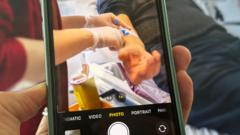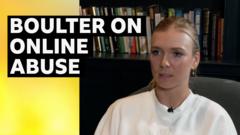Should Hospital Patients Avoid Filming on TikTok?

Patients Filming Their Medical Treatment: A Growing Concern for NHS Staff and Patient Privacy
In the age of social media, where sharing personal experiences has become a cultural norm, the practice of patients filming their medical treatments is raising significant concerns. The Society of Radiographers (SoR) has recently highlighted the risks associated with this trend, emphasizing potential distractions for medical staff, breaches of patient confidentiality, and the emotional toll on healthcare professionals. As patients increasingly share their medical journeys on platforms like TikTok and Instagram, it becomes imperative to examine the implications of such actions on both the healthcare system and patient privacy.
Understanding the Issue: What’s Happening in Healthcare Settings?
With the rise of social media, many patients are documenting their medical experiences, often without seeking permission from healthcare providers. At the SoR's annual conference, several healthcare professionals voiced their concerns over this practice. The increase in patients filming procedures can lead to distractions, making it difficult for staff to focus on delivering quality care.
The Impact on Healthcare Professionals
Healthcare workers, including radiographers, have reported feeling uncomfortable and anxious when patients record their treatments. Ashley d'Aquino, a therapeutic radiographer from London, shared her experience of being filmed while trying to set up a treatment. Such interruptions can hinder medical professionals’ ability to concentrate fully on their responsibilities, which can ultimately affect the quality of care provided to all patients.
Privacy Concerns for Patients
One of the most significant concerns regarding patients filming their medical procedures is the risk of exposing the private medical data of others who may be present in the same facility. Most healthcare professionals wear identification badges that display their names and job titles, making them easily identifiable in videos. In a shared space like a hospital, the potential for inadvertently recording others is high, raising critical questions about patient confidentiality.
The Ethical and Legal Implications of Filming in Healthcare
The ethical considerations surrounding patients filming their medical treatments go beyond just discomfort for staff. There are legal implications as well. Under laws governing healthcare privacy, such as the General Data Protection Regulation (GDPR) in the UK, healthcare providers must ensure that patient data remains confidential. This includes not only the data of the patients being filmed but also the data of any other individuals captured in the video.
Potential Breaches of Confidentiality
When patients share videos on social media, they risk breaching confidentiality. Prof Meghana Pandit, co-national medical director at NHS England, emphasized the importance of discussing any recording with staff before proceeding. She noted that recording conversations and treatments without consent can lead to significant legal ramifications for the individual and the healthcare institution.
The Emotional Toll on Healthcare Staff
Healthcare professionals often face high-stress environments, and the added pressure of being filmed can lead to emotional distress. A department assistant from the south coast of England recounted a situation in which a patient’s daughter filmed a procedure without permission. The staff member expressed anxiety about whether they had performed their job correctly, illustrating the psychological impact that filming can have on healthcare workers.
Guidelines for Responsible Recording in Healthcare Settings
As the trend of filming medical experiences continues, it is crucial to establish guidelines that protect both patients and healthcare professionals. The SoR is advocating for NHS trusts to implement clear policies regarding recording procedures. Here are some proposed guidelines for responsible filming in healthcare settings:
- Seek Permission: Always ask for consent from healthcare professionals before recording any part of a medical procedure.
- Limit Filming to Personal Use: Ensure that recordings are for personal use only and not shared on social media without permission.
- Protect Patient Privacy: Be mindful of others who may be present in the treatment area to avoid recording them inadvertently.
- Discuss with Staff: Engage in a conversation with healthcare staff about the appropriateness of filming in specific situations.
- Follow Institutional Policies: Familiarize yourself with and adhere to the policies set by the healthcare institution regarding filming and photography.
The Role of Healthcare Institutions in Mitigating Risks
Healthcare institutions play a pivotal role in managing the risks associated with patients filming their medical treatments. By creating and enforcing clear policies, they can ensure that both patient rights and staff well-being are protected. Here are some steps that NHS trusts can take to address this issue:
Develop Clear Policies
NHS trusts should create comprehensive policies outlining the guidelines for patients wishing to film their medical procedures. These policies should be communicated to patients upon admission and displayed throughout the facility to raise awareness.
Training for Staff
Healthcare professionals should be trained to handle situations where patients wish to record procedures. This training can help staff feel more comfortable addressing these requests while maintaining a focus on patient care.
Patient Education
Educating patients on the implications of filming their treatments is essential. Information sessions or brochures can help patients understand the importance of confidentiality and the potential risks of sharing their experiences on social media.
Conclusion: Balancing Patient Experience with Professional Integrity
As social media continues to shape how patients share their medical journeys, it is crucial to find a balance between empowering patients to document their experiences and protecting the integrity of healthcare providers and patient privacy. While there can be benefits to recording medical consultations—such as aiding memory recall—patients must be aware of the potential consequences of their actions. Clear guidelines and open communication between patients and healthcare professionals are essential in navigating this evolving landscape.
As we move forward, healthcare institutions must prioritize policies that uphold confidentiality and respect for all patients while allowing individuals to share their experiences responsibly. How can we ensure that the rise of social media does not compromise the quality of care we provide? #PatientPrivacy #Healthcare #SocialMediaResponsibility
FAQs
What should I do if I want to film my medical appointment?
Before filming, it’s essential to discuss your intentions with your healthcare provider and seek their permission. This helps ensure that you respect the privacy of others and adhere to institutional policies.
Are there legal ramifications for filming in a healthcare setting?
Yes, filming without consent can potentially breach patient confidentiality laws, leading to legal consequences for both the individual filming and the healthcare institution.
How can healthcare providers address the issue of patients filming treatments?
Healthcare providers can implement clear policies regarding filming, train staff on how to handle filming requests, and educate patients about the importance of confidentiality.
Published: 2025-06-17 01:35:11 | Category: technology



